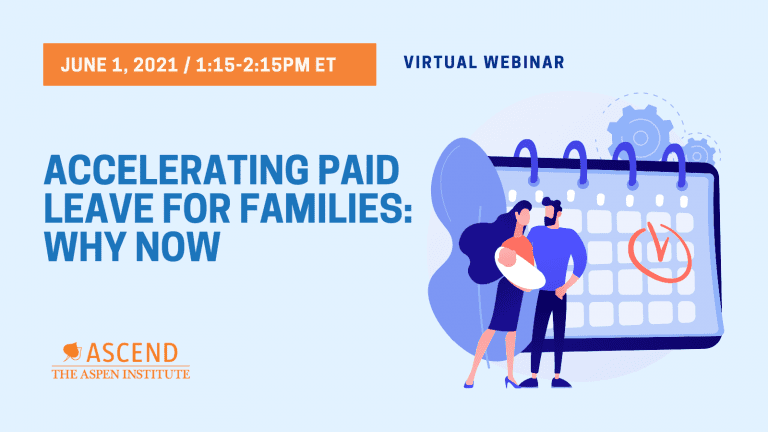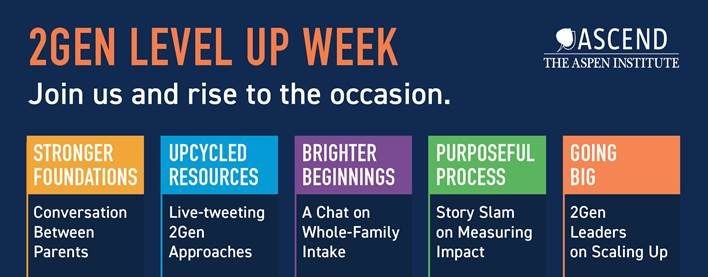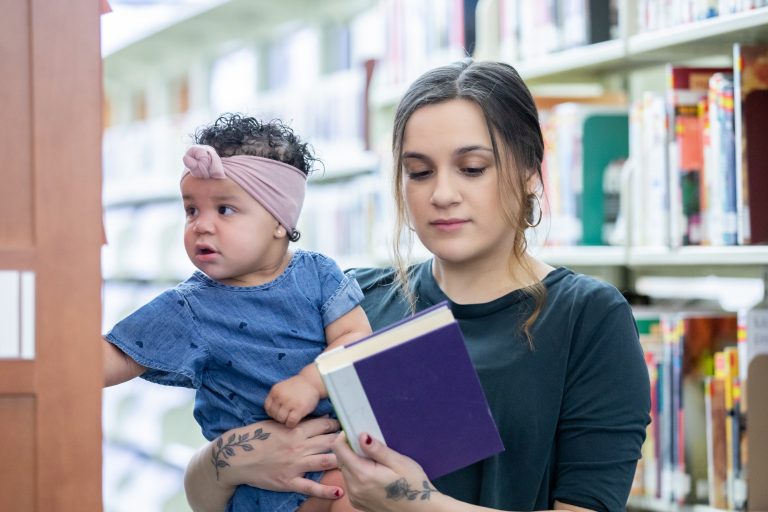Webinar: New Federal Opportunities to Advance 2Gen Approaches
Ascend hosted a webinar on July 12, 2018 to share new funding opportunities in the 2018 federal budget as found in the new Ascend brief: New Federal Opportunities to Advance Two-Generation Approaches to Improving the Lives of Children and Parents. The federal government will be providing significant new funding to state and local governments in 2018 and future years through an array of programs serving children and parents with low incomes. These new funding streams, and the legislation’s increased focus on improving outcomes using evidence-based approaches, create a remarkable opportunity for path-breaking governors and local leaders to transform how government tackles intergenerational poverty.
Webinar speakers included Roxane White, Morgridge Family Economic Security Innovator in Residence at Ascend, Kathryn Stack, consultant and former Advisor for Evidence Based- Innovation and Deputy Associate Director for Education, Income Maintenance and Labor at the Office of Management and Budget; and Anne Mosle, Vice President at the Aspen Institute and Executive Director at Ascend.
Check out the webinar recording on our GoTo channel here and read on for a Q&A on available resources, including how nonprofits can apply for funding, early childhood development opportunities, and state and county leaders.
On how applied research and engagement centers can leverage funding opportunities to support 2Gen programming:
First, if you have existing relationships with State Departments of Human or Social Services, Labor, and Child Protection, reach out to them and get engaged in their Family First planning and other efforts. Second, engage and work with local nonprofits and governmental entities to understand their current level of evidence and enhance it. Also, reach out and help those who have promising practices to move to the next level, recommend areas for research and evaluation and help improve the evidence base.
In addition, you may want to tap into researcher networks such as Research 4 Impact that are helping researchers connect with each other and with practitioners to build capacity for high quality research to inform practice.
On how nonprofits can partner with state and local governments to apply for funding:
Work with your state and county to find opportunities to apply for the funding. This will depend on your state and county and the funding source, but most of the programs have extensive collaborative efforts with nonprofits, faith based organizations and the local communities. While the vast majority of the funds will go to State entities and education institutions for program roll out, look for RFPs and partnership opportunities. Talk to your state and county administrators about their plans. Additionally, some of the Opioid funding will be available for direct application.
On state and county-level leaders pioneering innovations:
Take a look at many of the recent Ascend publications, for example States Leading the Way: Practical Solutions that Lift Up Children and Families, Tackling Intergenerational Poverty in Utah, Building a Thriving Tennessee: A 2Gen Approach, or Reinventing the Way We Measure Family Outcomes. These are all excellent examples of Ascend Network Partners who are focused on how to bring systems together to help decrease intergenerational poverty. Some of the common themes are social capital, blending and braiding funding, systematic integration of change and accountability for families; legislative and executive support for 2Gen family outcomes; incorporation of brain science, resiliency and trauma-informed care into family support.
On Department of Labor guidance for transportation activities:
The Department of Labor will be issuing implementation guidance on what activities are allowable. To help shape that guidance, state and local governments and other experts can provide input to DOL on ways the program could be used to help the unemployed overcome transportation barriers that are slowing their return to work.
On blended funding opportunities for disconnected youth:
Performance Partnership Pilots (P3) for Disconnected Youth information can be found on the Youth.gov site. These programs are for up to 10 new state or local jurisdictions each year to obtain waivers and blend program funding that impeded outcomes for at risk youth. Examples underway of similar work include the Colorado Pay for Success/Outcomes work. The legislation was just passed and signed into law and it will focus on evidence based work with juvenile justice. Colorado already has an extensive 2Gen approach underway in youth corrections, as does Utah, to bring together systems, support families, help young people engage back in the community, and with education.
On opportunities with the Family Engagement Center:
For those not familiar with the program, a quick overview of Family Engagement Center Information. The US Department of Education will likely continue to have the most recent information. The comment period expired on May 11, 2018 and updates should be available soon.
Additional Resources
- General funding opportunities: Organizations can search the two websites below to find funding opportunities:
- Partnerships: Below are a few organizations looking for local partners:
- Early childhood education and development: ECE and ECD funding opportunities can be found on this website: Education, Early Childhood (Pre-Kindergarten) Federal Grants
- CCAMPIS: More information regarding the CCAMPIS grant & specific application requirements can be found here: Department of Education, Child Care Access Means Parents in School Program.
- Requirements: If your organization is looking for requirements, you will want to monitor the Federal Departments’ websites for further information on the funding stream of interest to you because many of the rules are still being written.
Related Posts















